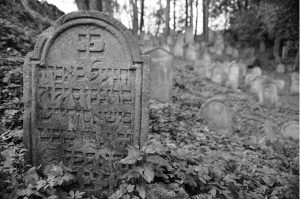Excellent question, especially given that Judaism is very much a religion that celebrates life and the here-and-now, and is not fixated on the next world, as are many other religions (Although we strongly believe that all we do in this world is leading to another, elevated and transcendental world).
The answer to your question is to be understood on multiple levels. We’ll focus on a couple: of them today:
- The Talmud describes the custom of celebrating birth using the image of a ship. How odd, it relates, that people hold a big party when the ship is about to sail, yet when it arrives at its destination, nothing is done! It really should be the other way around. Although the day of our birth holds all the potential for the life that will be, the day we die is the marker of who we actually became. Our worth is measured according to how much of our potential was realized. Did we live up to who we were to the best of our ability in the time that we had?
- When our loved ones die and go back to G-d, to their “home port,” we mourn not having them here with us, yet we remember what they accomplished in this life. The yahrtzeit’s annual commemoration is a time to feel sadness but also to celebrate who a loved one was, their accomplishments and the life that he or she lived. (See “Remember My Soul”, K’hal Publ. pp. 142).
- On a deeper level, I heard from my mentor, a Kabbalistic sage in Jerusalem, that Death is a transition from one type of existence to another. In the Mishna and Talmud the same word, “kever,” is used to mean both “womb” and “grave.” This seems very strange. This teaches us that just as the womb is the portal from a limited level of existence to another plane of much greater potential, so too, the grave is a portal from our limited physical existence to a spiritual existence that is not bound by time, space or matter.
Put more simply, every “death” in one world is also a “birth” in another, transcendent world. It is very shocking to imagine as the deceased family and loved ones are crying and lamenting his or her loss in the world they have just left, at the same moment a great rejoicing is taking place in the other world that they have just been “born” into by those of that world sharing in the joy of that birth. The deceased is now with them to share his or her unique experiences of life and to reap the rewards and eat the fruits of their many efforts in the world they left behind.
This idea, that death precedes another type of life, is clearly alluded to in the verse in Deuteronomy: “See now that I, I am He-and no god is with Me. I put to death, and I bring life…” (32:39). Note that in the above verse G-d first brings about death, followed by new life.
The verses in the Torah describing death indicate the continued existence of the soul beyond this world. It also implies that the soul is somehow reunited with one’s ancestors. “ And Abraham expired and died at a good old age…and he was gathered to his people.” (Gen. 25:8). “He lay down with his fathers”, (ibid 47:30). “…he was gathered to his people,” (numerous verses). (See “Gateways to Judaism”, Shaar Press pp 61-2).
With this understanding you can see how both sides of your question are correct: we are marking our loved one’s birthday and death day at the same time!
Sincerely,
Rabbi Yerachmiel Fried


